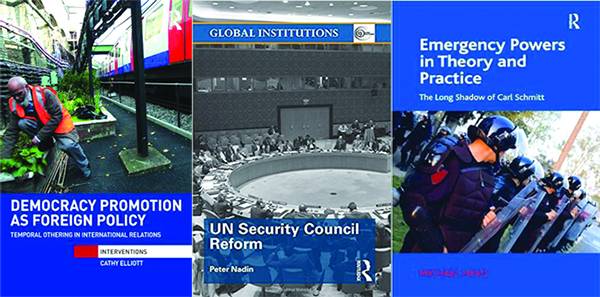
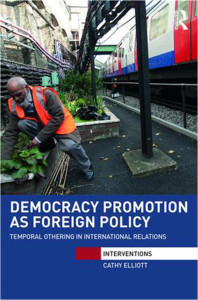
Democracy Promotion as Foreign Policy; Temporal Othering in International Relations
Cathy Elliott
Routledge (2017)
Rs14,799
This book looks at democracy promotion as a form of foreign policy. Elliott asks why democracy was seen to be the answer to the 7/7 bombings in London, and why it should be promoted not in Britain, but in Pakistan. The book provides a detailed answer to these questions, examining the logic and the modes of thinking that made such a response possible through analysis of the stories we tell about ourselves: stories about time, history, development, civilisation and the ineluctable spread of democracy.
Elliott argues that these narratives have become a key tool in enabling practices that differentiate selves from others, friends from enemies, the domestic from the foreign, civilisation from the barbarian. They operate with a particular conception of time and constitute a British, democratic, national identity by positing an “other” that is barbaric, alien, despotic, violent and backward. Such understandings are useful in wake of disaster, because they leave us with something to do: danger can be managed by bringing certain people and places up-to-date. However, this book shows that there are other stories to be told, and that it is possible to read stories about history against the grain and author alternative, less oppressive, versions.
Providing a genealogy drawing on material from colonial and postcolonial Britain and Pakistan, including legislation, political discourse, popular culture and government projects, this book will be of interest to scholars and students focusing on democracy promotion; genealogy; critical border studies; poststructural IR; postcolonial politics; discourse analysis; identity/subjectivity; and “the war on terror”.
Cathy Elliott is a Senior Teaching Fellow at the School of Public Policy, University College London. She previously worked as a development manager in Pakistan. Her research interests include poststructural international relations; time, temporality and history; politics and aesthetics and feminism and gender.
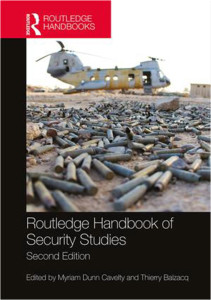
Routledge Handbook of Security Studies (2nd Edn)
Eds Myriam Dunn Cavelty, Thierry Balzacq
Routledge (2017)
Rs24,666
This revised and updated second edition features over twenty new chapters and offers a wide-ranging collection of cutting-edge essays from leading scholars in the field of Security Studies.
The field of Security Studies has undergone significant change during the past 20 years, and is now one of the most dynamic sub-disciplines within International Relations. This second edition has been significantly updated to address contemporary and emerging security threats with chapters on organised crime, migration and security, cyber-security, energy security, the Syrian conflict and resilience, amongst many others. Comprising articles by both established and up-and-coming scholars, The Routledge Handbook of Security Studies provides a comprehensive overview of the key contemporary topics of research and debate in the field of Security Studies.
The volume is divided into four main parts:
• Part I: Theoretical Approaches to Security
• Part II: Security Challenges
• Part III: Regional (In)Security
• Part IV: Security Governance
This new edition of the Handbook is a benchmark publication with major importance for both current research and the future of the field. It will be essential reading for all scholars and students of Security Studies, War and Conflict Studies, and International Relations.
Myriam Dunn Cavelty is Senior Lecturer and Deputy Head of research and teaching at the Center for Security Studies (CSS), ETH Zurich, Switzerland. She is the author of Cyber-Security and Threat Politics: US Efforts to Secure the Information Age (Routledge, 2008).
Thierry Balzacq is Professor and Tocqueville Chair in International Relations at the University of Namur, Belgium, and Scientific Director at the Institute for Strategic Research at the French Ministry of Defense. His most recent books include Contesting Security (Routledge, 2014), and Traité de Relations Internationales (co-edited with F. Ramel, 2013).
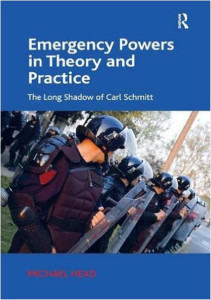
Emergency Powers in Theory and Practice: The Long Shadow of Carl Schmitt
Michael Head
Routledge (2016)
Rs15,621.00
Why have the early years of the 21st century seen increasing use of emergency-type powers or claims of supra-legal executive authority, particularly by the Western countries regarded as the world’s leading democracies, notably the United States? This book examines the extraordinary range of executive and prerogative powers, emergency legislation, martial law provisos and indemnities in countries with English-derived legal systems, primarily the UK, the US and Australia. The author challenges attempts by legal and academic theorists to relativise, rationalise, legitimise or propose supposedly safe limits for the use of emergency powers, especially since the September 2001 terrorist attacks. This volume also considers why the reputation of Carl Schmitt, the best-known champion of ‘exceptional’ dictatorial powers during the post-1919 Weimer Republic in Germany, and who later enthusiastically served and sanctified the Nazi dictatorship, is being rehabilitated, and examines why his totalitarian doctrines are thought to be of relevance to modern society. This diverse book will be of importance to politicians, the media, the legal profession, as well as academics and students of law, humanities and politics.
Michael Head is Professor of Law, University of Western Sydney, Australia. He has published a substantial range of books and refereed articles relating to public law, legal theory and civil liberties.
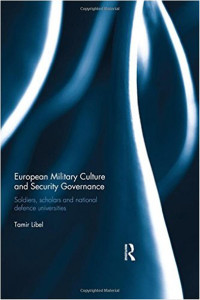
European Military Culture and Security Governance: Soldiers, Scholars and National Defence Universities
Tamir Libel
Routledge (2016)
Rs14,799
This book offers the first systematic, comparative analysis of military education and training in Europe within the context of the post-Cold War security environment. Based on an analysis of military education institutions in the UK, Germany, Finland, Romania and the Baltic States, this book demonstrates that the convergence of European military cultures since the end of the Cold War is linked to changes in military education. The process of convergence originates, at least in part, from the full or partial adoption of a new concept by post-commissioning professional military education institutions: the National Defence University. Officers are now educated alongside civilians and public servants, wherein they enjoy a socialization experience that is markedly different from that of previous generations of European officers, and is increasingly similar across national borders. In addition, this book argues that with the control over the curricula and graduation criteria increasingly set by civilian higher education authorities, the European armed forces, while continuing to exist, and hold significant (although declining) capabilities, stand to lose their status as a profession in the traditional sense.
This book will be of much interest to students of military, European security policy, European politics, and IR in general.
Tamir Libel is a Research Fellow at the Barcelona Institute of International Studies, Spain. He has a PhD in Political Studies from Bar-Ilan University, Israel.
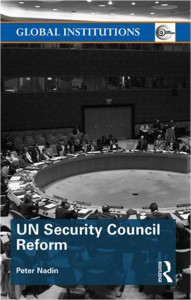
UN Security Council Reform
Peter Nadin
Routledge (2016)
Rs14,799
This volume comprehensively evaluates the current state and future reform prospects of the UN Security Council, providing the most accessible and rigorous treatment of the subject of reform to date. Apart from a couple of critical eyes in the academic community, few have asked the pertinent questions that this volume seeks to address: Will the enlargement of the Council constitute a reform? Could the inclusion of countries such as India, Germany, Japan, and Brazil markedly improve the Council’s agency?
In response, this book focuses on: The Role and Agency of the UN Security Council; The History of the Reform Debate; An Expanded Council; Working Method Reforms and Enhancing Agency. As the future of the UN Security Council continues to be the focus of fierce debate, this book will be essential reading for students of international relations, international organizations and international security studies alike.
Peter Nadin is a researcher, policy analyst, and consultant based in Sydney, Australia. His research interests include UN peace operations, armed groups, leadership in UN missions, and the UN Security Council. He has previously worked as a project associate at the United Nations University in Tokyo.

